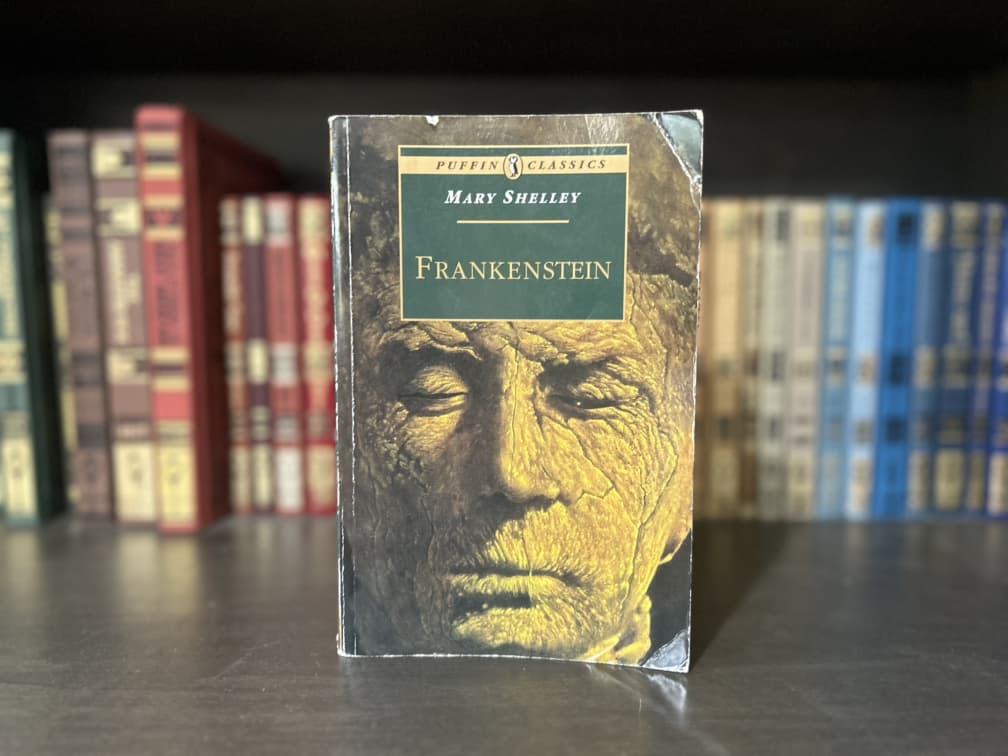Review of Frankenstein
This book was born from the nightmares of its author, Mary Shelley, who realized that what horrified her would frighten readers as well. The specter that appeared in her dreams led the way to a world of its own in her mind, fostered by the literary masters she surrounded herself with. Thus, one of the best-known horror novels was written: Frankenstein, a tale of genius, poor accountability, and the consequences of rash and foolish actions.

A common misconception about this book is that Frankenstein is the name of the monster when in fact, it is the name of the man who created the monster. The creature itself is never given a name throughout the story.
A second misconception, most likely spread by popular culture, is that the man Frankenstein is some kind of evil or mad scientist who created his monster with evil intent. Shelley’s original portrayal of Frankenstein is that of a gifted genius, blinded by the pursuit of knowledge, who creates life of his own without foreseeing the potential consequences. He has no ill will of his own but blames fate for his misery when the rotten fruit of his labor comes to fruition.
In my opinion, I felt that Victor Frankenstein was not a casualty of the fickleness of fate as he claimed, but instead the product of his own stupidity. For someone who can give life to inanimate objects, every action he makes is foolish and shortsighted. He blames his hardships and poor decisions on fate instead of taking any amount of accountability.
One of the most aggravating aspects of his actions is his aversion to telling anyone of his actions, his refusal to ask anyone for help or advice, and his failure to warn anyone of this potential danger. He won’t tell any professors, his best friend, his father, or even his newly wed wife of either his actions or the danger aroused by his monster.
He expresses a desire to destroy his creation throughout the whole book, but even though the monster tells him to his face that bullets severely wound him and that he can’t heal faster than any other human, Frankenstein doesn’t even consider this as an option until his wedding night. It’s as if he’s trying to act in the way that will most infuriate his monster while also making sure he and all his family are as vulnerable as possible. He’s inconsistent, indecisive, short-sighted, foolish, and won’t try to change it or take accountability for making himself thus.
As for the monster himself, I felt pity for him; his grievances are just, and his short life has given him very little but hardship. Although this doesn’t excuse his murders, it makes sense that he turned out how he did, especially because he was given no proper direction in life nor training in righteousness or goodness.
Between Frankenstein and the monster, I would side with the monster on the issue of whose case is more just, although I would still have to punish the creature for his murders. If Frankenstein had behaved like a man, taken responsibility for his actions, and done what he could to guide his creature in the right direction, the story could have turned out much better, and no one would have had to die. But instead, he weeps and falls into nervous fevers and moody fits every time an opportunity arrives for action and ramifications. In short, he’s at fault for everything that happened, and the deaths of every person are on his hands.
I enjoyed this book, as its contents were very interesting and kept me reading to find out what happens. The natural genius of Frankenstein is contrasted with the foolishness of his actions and the shortsightedness of his plan. He acts rashly and foolishly, taking few contingencies into his plans. The spirit of revenge permeates the second half of the story once the murders start adding up. This book also raises a lot of interesting dilemmas over whose actions are the most moral, or just considering the circumstances.
In the end, Frankenstein is a warning to those who seek to play God with the knowledge and material He has given to us. In my opinion, it shows the dangers of keeping one’s problems to themselves and how it ends up hurting others instead of saving them. My takeaway is that being a good man is not determined merely by what you can accomplish; taking ownership of your actions and mistakes is far more virtuous and requires much more strength, making you a better man than the person who fails to do so.
